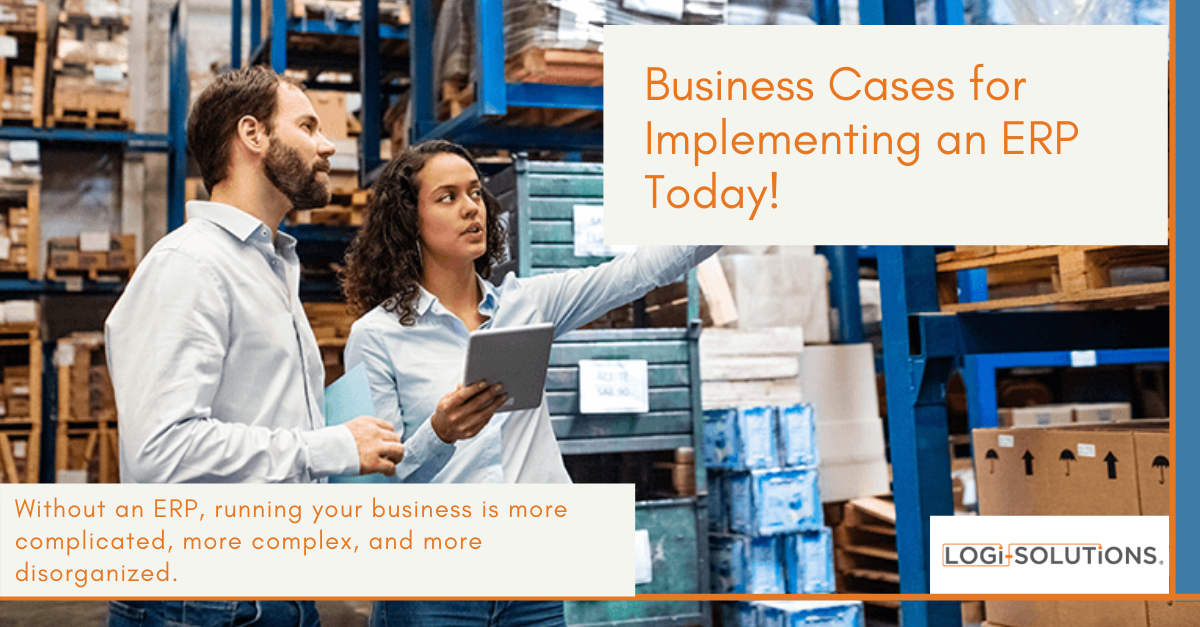Here are 8 business cases for implementing an ERP today
ERP, Enterprise Resource Planning – it sounds complicated, and it is in fact a complex solution for managing businesses. But without an ERP Software, running your business would be even more complicated, more complex, and more disorganized.
It doesn’t matter how great your products or services are; if you and your team are running around behind the scenes, duplicating manual processes, losing orders, and unsure of what your financial statements look like, then your business will never reach its full potential.
Want to learn more? Download the white paper How to choose your next ERP
Business Case #1 for Implementing an ERP: Say Goodbye to Numerous, Individual Systems
If we had to guess, you’re likely using a handful of software systems right now – one to communicate internally, one for finances, one for order tracking and inventory levels – the list probably goes on.
By investing in an ERP Software, you and your staff can combine all of your tracking into one, seamless system.
This cuts back on unnecessary spending, on password management, and lost data.
Business Case #2 for implementing an ERP: Say Goodbye to Paper
Paper and manual processes have their place…. When you’re first starting out. By the time you’re reaching SMB or enterprise level, however, paper processes are more likely to cause confusion, duplicated efforts, or even lost information.
An ERP can help you move your tracking and recording to the cloud, so all staff can access information in realtime from any device.
This ensures everything is always up-to-date, no one is operating off of false information, and most importantly – no data gets lost.
All of this leads to less errors, less time wasted, and less repetitive work.
Business Case #3 for Implementing an ERP: Grow Globally
Firms around the globe need your products or services – those firms also likely have strict regulations about who they work with, and how.
An ERP Software can help ensure you’re meeting local tax regulations, can likely integrate seamlessly into the system your potential client is using, and can help you track data specific to each location – so you know exactly what works, where.
Business Case #4 for Implementing an ERP: Get Faster
Speed matters – how quickly can you get back to a potential customer? How fast can you find that one specific product in the warehouse?
With an ERP, all of your data is at your fingertips – exactly what you need, when you need it. And you can be confident it’s always the latest, most up-to-date version. You can extract data, share analytics, and quickly report to clients and internal teams on how each aspect of the business is performing.
Business Case #5 for Implementing an ERP: Accurate Inventory Management
Regardless of whether your business operates using an automated online store or whether customers call in to your business to place an order, it’s important inventory is up-to-date and 100% accurate. There is nothing worse than selling a product that doesn’t exist – unless maybe, it’s turning down a sale when you didn’t have to.
With an ERP, you can be sure inventory tracking is always accurate. You can also get notified ahead of time when items need to be reordered, know what items are in transit, and what inventory isn’t moving.
An ERP Software can save you from having to search your warehouse ever again.
Business Case #6 for Implementing an ERP: Less Stress for IT
Regardless of what systems you’re running on, your business relies on an IT team to keep them running. The more systems and software programs you have, the more difficult it is for your IT department to keep them all running smoothly and integrated properly.
With an ERP Software, you can give IT a break, and let them focus their attention on one single system. Of course, having just one main system means you and your employees aren’t worried about stable integrations, either.
Business Case #7 for Implementing an ERP: Data on the Move!
With traditional software systems, most functionality lies in the desktop version, with more limited insights (if any) available via an app. With an ERP, up-to-date data is available to all team members – whether they’re in the office or on the road. Computers, laptops, tablets, cell phones – an ERP can be installed on any device and accessed from virtually anywhere, by anyone.
This way, everyone is always informed of the latest insights.
Business Case #8 for Implementing an ERP: Financial Accuracy
An ERP Software will make life easier for your entire accounting department – trust us, they’ll thank you for this! When employees have to manually enter and access data (including sale transactions, discounts, overdue payments, and customer history), it can take exponentially longer over the course of a year.
Being able to pull the required data to reconcile accounts can quickly deliver an accurate financial forecast to VPs, Board Members, or external stakeholders and auditors. Not only is this a relief for your accounting team, but can result in faster, more accurate decision making as well.
Implementing an ERP is a big step
Implementing an ERP Software can quickly catapult your business to the next level, with faster, more accurate, and more readily available data. If you already have an ERP Software but it’s just not working for you, it may be time to upgrade or find a better fit for your unique business.
At LOGI-SOLUTIONS, we believe in striving for 100% use of the solutions we implement – no wasted software functionality. Learn more about how an ERP solution can help your team work faster and more efficiently.

